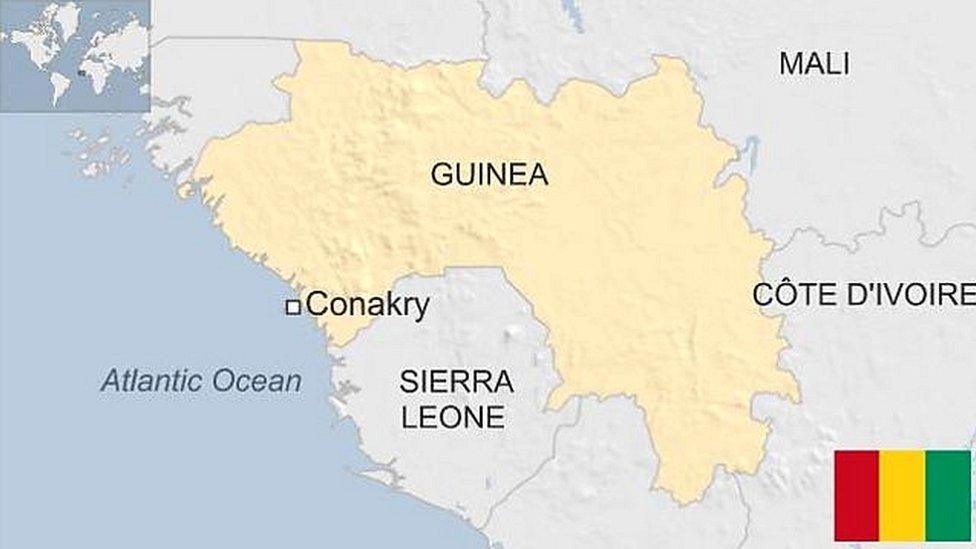Guinea country profile
- Published

Guinea's mineral wealth makes it potentially one of continent's richest countries, but its people are among the poorest in West Africa.
Experiments with socialism and a two-year rule by junta have taken their toll on prospects for development. The 2010 election ushered in a decade of civilian rule, but led to violent ethnic clashes as well.
In addition, hundreds of thousands of refugees from Liberia and Sierra Leone have strained Guinea's struggling economy.
The instability has generated suspicion and ethnic tension - as well as accusations between neighbours of attempts at destabilisation and border attacks.
Read more country profiles, external - Profiles by BBC Monitoring, external
REPUBLIC OF GUINEA: FACTS
Capital: Conakry
Area: 245,857 sq km
Population: 13.2 million
Languages: French, plus Arabic, English, Susu, Pular, Maninka and others
Life expectancy: 61 years (men) 62 years (women)
LEADER
Military leader: Mamady Doumbouya
Lt Col Mamady Doumbouya, the commander of the country's special forces, overthrew President Alpha Conde in a coup in September 2021. He accused the president of rampant corruption, human rights abuses, and mismanagement.
Lt Col Doumbouya set up the National Committee of Reconciliation and Development with himself as chairman, ordered the release of political prisoners, and announced an 18-month transition to democracy.
Alpha Conde, a veteran opposition politician, became president in 2010 in Guinea's first democratic election since independence. He was re-elected in 2015, but faced protests four years later when he changed the constitution to run for a third term.
In September 2022, the Economic Community of West African States (Ecowas) imposed sanctions on individuals in the military government in response to the coup.
MEDIA
Media pluralism is a reality in Guinea, and journalists enjoy a degree of freedom of expression. But the civilian government often failed to uphold this standard in practice.
It remains to be seen if the transitional government, installed after the September 2021 coup, will deliver on freedom of the press issues.
TIMELINE
Guinea's first president, Sekou Toure, was a leading figure in the drive to decolonise Africa
Some key dates in Guinea's history:
What is now Guinea was on the fringes of key West African empires.
300-1100 - The Ghana Empire. During this period Islam arrives in the region via North African traders.
12th Century - After the collapse of the Ghana Empire, the Sosso Empire flourishes.
13th-15th Century - The Mali Empire defeats the Sosso ruler Soumangourou Kanté at the Battle of Kirina, in c. 1235.
15th Century - Mali Empire is ultimately supplanted by its vassal states.
1460s - The Songhai Empire surpasses the Mali Empire in both territory and wealth. It is riven by civil war in the 1580s and is conquered by invaders from Morocco but then splits into smaller kingdoms.
After the fall of some of the West African empires, various kingdoms existed in what is now Guinea.
17th Century - European traders arrive
1850s - Increasing French military activity in the region.
1891 - France declares Guinea to be a colony, separate from Senegal.
1898 - French forces defeat the armies of Samori Touré, Mansa (or Emperor) of the Ouassoulou state, giving France control of what today is Guinea and adjacent areas.
1958 - Guinea becomes independent, with Ahmed Sekou Toure as president.
2003 - President Lansana Conte wins a third term in elections boycotted by the opposition.
2008 - Military seizes power after President Conte dies. The coup meets with international condemnation, but many Guineans back the army's move.
2010 - Return to civilian rule. Alpha Conde declared winner of run-off presidential race.
2014 - Outbreak of the deadly Ebola virus in southern Guinea. It spreads to Liberia and Sierra Leone, killing 11,300 people in two years.
2021 - President Conde is overthrown in a coup.
An outbreak of the Ebola virus had a major effect on Guinea
- Published26 February
- Published9 July
- Published28 July 2023
- Published24 July 2023
- Published13 February
- Published27 November 2023